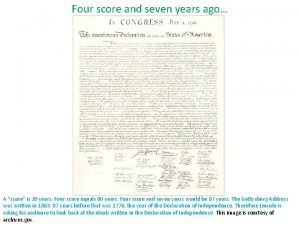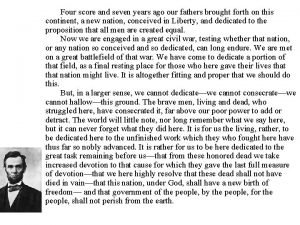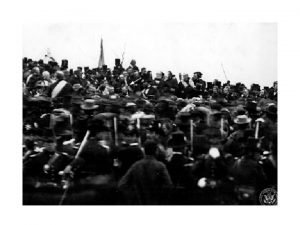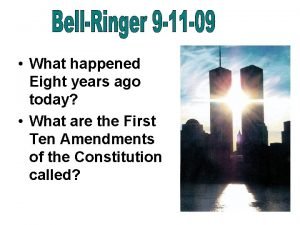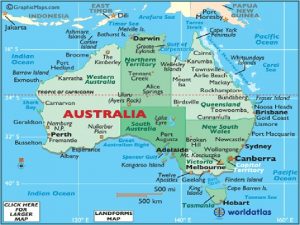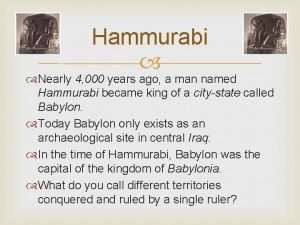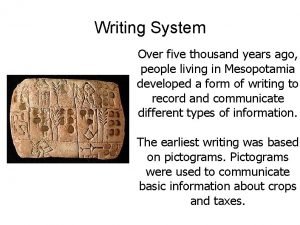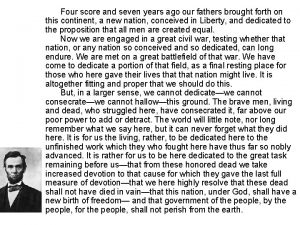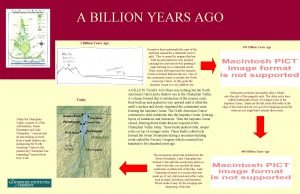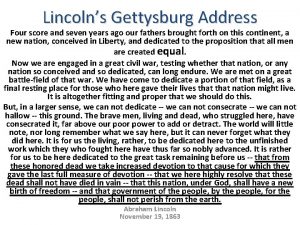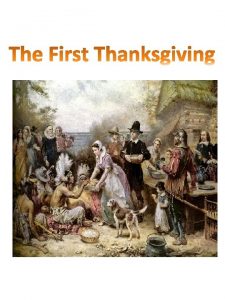Four score and seven years ago that from
































- Slides: 32

Four score and seven years ago… • -- that from these honored dead we take increased devotion to that cause for which they gave the last full measure of devotion -- that we here highly resolve that these dead shall not have died in vain -- that this nation, under God, shall have a new birth of freedom -- and that government of the people, by the people, for the people, shall not perish from the earth. Abraham Lincoln’s Gettysburg Address

– I here declare my unmitigated hatred to Yankee rule -- to all political, social and business connection with the Yankees and to the Yankee race…May such sentiments be held universally in the outraged and down -trodden South… until the now fardistant day shall arrive for just retribution for Yankee usurpation, oppression and atrocious outrages, and for deliverance and vengeance for the now ruined, subjugated and enslaved Southern States! » Edmund Ruffin who fired the first shots at Ft. Sumter

Chapter 15 The ruins of a Train Depot after the Civil War. Reconstruction

Lincoln Assassinated • Abraham Lincoln was shot by John Wilkes Booth on April 14, 1865, while attending a play at Ford’s Theatre in Washington D. C. • He died the next day.

The north mourned the loss of Lincoln and a massive manhunt began to hunt down his killer

• John Wilkes Booth was a famous theatre actor and a southern patriot. After the assassination he was hunted down and shot dead on a farm in Virginia by the U. S. Army. Booth’s co-conspirators where tried for treason and hung.

The war ends in Texas • On June 19 th 1865 Union General Gordon Granger arrives in Galveston and announces the war is over to Texas and that all the slaves are to be set free! • Juneteenth has been celebrated in Texas ever since as the anniversary of freedom to African Americans in Texas. Gordon Granger

The people of Texas are informed that, in accordance with a proclamation from the Executive of the United States, all slaves are free. This involves an absolute equality of personal rights and rights of property between former masters and slaves, and the connection heretofore existing between them becomes that between employer and hired labor. The freedmen are advised to remain quietly at their present homes and work for wages. They are informed that they will not be allowed to collect at military posts and that they will not be supported in idleness eithere or elsewhere.

Freedman • A freedman or freeman is a person who has been freed from slavery. All former slaves were now freedman. • Many moved from old plantations and started “Freedtowns” or black communities.

Freedman Problems – Many didn’t have jobs or homes. – Some looked for longlost relatives. – Some traveled to cities searching for work. – Some remained on the plantation working for wages or a portion of the crop.

• The Freedmen’s Bureau was created by Congress to help former slaves by supplying food, shelter, medicine, and in many cases, jobs. • The freedmen’s bureau faced many challenges from southerners who would attempt to intimidate and in some cases kill freedmen’s bureau workers. • The Freedmen’s bureau's major success was in the creation of schools for the former slaves and their children. Freedman’s Teacher School


Presidential Reconstruction Andrew Johnson, as the President after Lincoln, set up four requirements for southern states to return to the union. 1. States had to accept the 13 th amendment that ended slavery 2. States had to declare that their secession had been illegal 3. States had to cancel all war debts 4. To receive the right to vote, all adult white males had to declare loyalty to the United States. The 17 th President of the United States, Andrew Johnson

• Andrew Johnson named Andrew Hamilton, a unionist, as governor of Texas. He called for a new constitutional convention. • James W. Throckmorton was elected as president of the convention. He had been a unionist, but fought in the Confederate army for Texas. Therefore he was thought to be a good choice. James W. Throckmorton

The Constitution of 1866 • The Constitution of 1866 was the same as the Constitution of 1845, except that Slavery was ended • Texas refused to adopt the 13 th amendment. President Johnson agreed to accept Texas back into the U. S. anyway. • The Southern governments also passed “Black Codes”. • These laws attempted to force former slaves back to labor on plantations

“Black Codes” • African Americans were second class citizens. • They could not marry whites. • They could not hold public office, vote, or serve on a jury.

Ch 15 Reconstruction The ruins of a Train Depot after the Civil War.

THE RADICAL REPUBLICANS Radical Republican leaders Thadeus Stevens and Charles Sumner • Although President Johnson agreed to let Texas back into the Union, Congress did not and refused to accept the Constitution of 1866. • The Radical Republicans saw Reconstruction as a way to punish the Southerners and gain fair treatment for freedman.

• Not long after Texas was refused its return to the Union, the Radical Republicans in Congress gained enough power to win any vote in Congress and overturn any presidential veto. The “Black Codes” convinced the Republicans that Texas could not be trusted to deal fairly with African Americans. Radicial Republicans impeached Andrew Johnson. He survived his trial in the Senate by only one vote.

• The Republican’s passed the Fourteenth Amendment. Among other parts of this amendment, it granted citizenship to former slaves. • The Fourteenth Amendment did away with the black codes and granted legal equality to former slaves. • Texas did not accept it and of the former Confederate states, only Tennessee agreed to the amendment. The Fourteenth Amendment

Reconstruction Act of 1867 • Congress was angered by Texas and the other Confederate states refusing to ratify the 14 th Amendment. • The Radical Republicans took a stand by passing the Reconstruction Act of 1867. – This act put Texas and the other Southern states (excluding Tennessee) under military rule. – This act divided the ten states into five military districts.

5 Military Districts • Texas was combined with Louisiana and placed in the 5 th district and fell under command of General Philip H. Sheridan.

Ironclad Oath • The military controlled the South for several years, the Governors were appointed had no real power. • Union troops began to register voters, but required those voters to take an “ironclad oath” which claimed that their past loyalty was only to the Union. • This meant that white men who were former Confederates could no longer vote. This angered many in the South

Carpetbaggers The South saw the Northerners as Carpetbaggers, or people trying to ruin the south for their personal gain.

The 15 th Amendment • The 15 th Amendment to the U. S. Constitution was passed to guarantee freedman the right to vote • Despite the efforts of the Klan, over 50, 000 African American men in Texas registered to vote. • Ten were even elected to the Constitutional Convention of 1869. Freedman Voting Matthew Gaines became a Texas State Senator in 1869.

AFRICAN AMERICAN LEGISLATORS

• The New Constitution of 1869: – This was a Radical Republican Constitution for Texas! – declared the Constitution of the U. S. as law – guaranteed the right of all men to vote or suffrage (regardless race, color, or former condition) – established the foundation for a public school system for ALL children – system of law enforcement • In November 1869 elections of officers of the new state government were held. • Radical Republican E. J. Davis was elected Governor

• Many Texans claimed that the army had unfairly made sure Davis was elected. • Many Texans remained determined to regain control of their state. • Davis and the legislature ratified the 14 th Amendment, which was a requirement from then US Congress for Reconstruction. • Texas was readmitted to the Union on March 8 th , 1870. E. J. Davis

The Redeemers • After Texas was re-admitted to the Union, President Ulysses S. Grant declared reconstruction over in Texas. • The Texas legislature gave Davis significant power. The people that opposed Davis were known as redeemers. They determined to “save” Texas from the Radical Republicans. • The redeemers called Davis’ programs the “Obnoxious Acts” Davis had been a General in the Union Army

The Redeemers “I won’t be Reconstructed!” • Soon the Supreme Court ruled that the Ironclad Oath was unconstitutional. The government has no authority to disenfranchise (take away the right to vote) people who had never been convicted of a crime in a court of law. Southerners hated the oath and a similar “Oath of Allegiance” they were forced to take after the war. They didn’t feel they should be “pardoned” for their actions and did not want forgiveness for the war. They felt they had fought for their rights. “Good Ole Rebel” -Popular song in the south at the time

In the 1872 elections, Democrats gained control of Texas and began to undo the actions of Davis was defeated in the 1873 governor’s race by Richard Coke was the first Democratic Governor in Texas since the war • Davis refused to leave office, claiming the election was a fraud. He and his supporters even barricaded themselves in their offices. • Eventually, Coke took office and this truly signaled the end of Reconstruction in Texas.

• The redeemers called a Constitution convention to re-write the Constitution once again. • The new Constitution of 1876 would supremely limit the power of the governor and allow the legislature to meet only every other year. As a result of the redeemers, African Americans soon lost much of the social ground they had recently gained. Racist “Jim Crow Laws” would The Constitution of 1876 is the be written and followed for over same one Texas has today, though many changes have been made. a hundred years.
 Four score and seven years ago meaning
Four score and seven years ago meaning Four score and seven years ago
Four score and seven years ago How long is four score and seven years?
How long is four score and seven years? Compare and contrast fashion today with twenty years ago
Compare and contrast fashion today with twenty years ago What happened 20 years ago today
What happened 20 years ago today It is easy to forget how difficult life was 50 years ago
It is easy to forget how difficult life was 50 years ago Saturn 4 billion years ago
Saturn 4 billion years ago Earth 4600 million years ago
Earth 4600 million years ago The earth 200 million years ago
The earth 200 million years ago Reptiles order
Reptiles order Halloween 2000 years ago
Halloween 2000 years ago Herbivores dinosaur
Herbivores dinosaur Technicom 15 years ago as a small
Technicom 15 years ago as a small 10 million years ago
10 million years ago Africa 1000 years ago
Africa 1000 years ago Australia 50 000 years ago
Australia 50 000 years ago 125 years ago today
125 years ago today 4 000 years ago
4 000 years ago Calories in 1 cup pasta
Calories in 1 cup pasta Family life 100 years ago
Family life 100 years ago Why did the barley sign change shape?
Why did the barley sign change shape? 3800 million years ago
3800 million years ago Shenzhen 30 years ago
Shenzhen 30 years ago Long long ago there was a king story
Long long ago there was a king story Two years ago jenny was diagnosed with schizophrenia
Two years ago jenny was diagnosed with schizophrenia Phân độ lown
Phân độ lown Block av độ 1
Block av độ 1 Thể thơ truyền thống
Thể thơ truyền thống Thơ thất ngôn tứ tuyệt đường luật
Thơ thất ngôn tứ tuyệt đường luật Walmart thất bại ở nhật
Walmart thất bại ở nhật Tìm vết của đường thẳng
Tìm vết của đường thẳng Con hãy đưa tay khi thấy người vấp ngã
Con hãy đưa tay khi thấy người vấp ngã Tôn thất thuyết là ai
Tôn thất thuyết là ai
